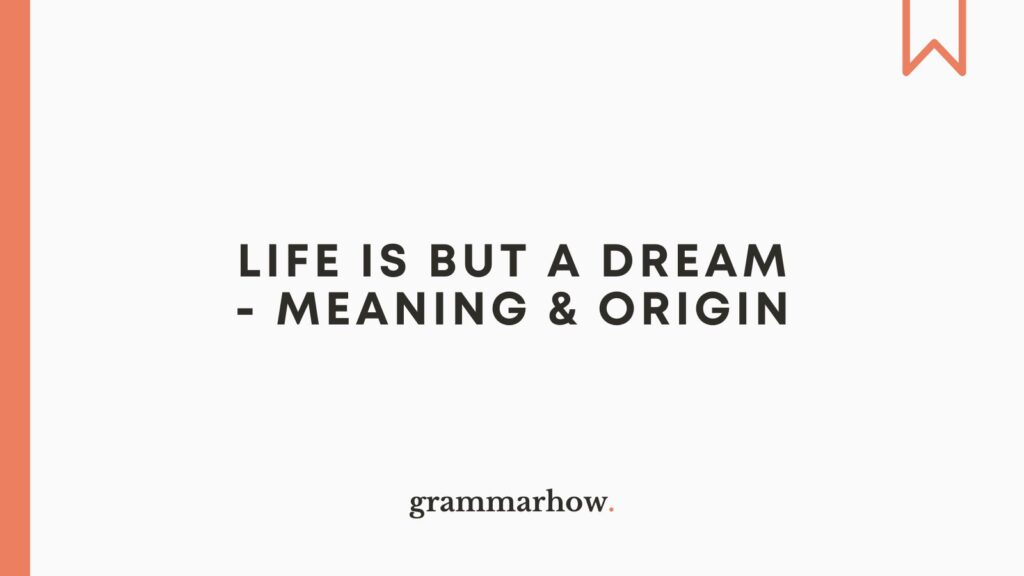It feels like we’ve all come across the phrase “life is but a dream.” But what exactly does this phrase mean? Why is there a “but” in it?
If the meaning behind this phrase is keeping you up at night, we’re here to help!
Life Is But a Dream – Meaning
The phrase “life is but a dream” is subject to many possible interpretations. We often regard it as a commentary on the fleeting nature of life. In particular, it comments on how, near the end of our days, our entire lives are nothing but a series of dream-like memories.
KEY TAKEAWAYS
- The phrase “life is but a dream” means that, at the end of our lives, everything we’ve done will just be a series of warped, unreliable memories – just like a dream.
- We don’t know the true origins of this phrase, but it has been popularized by the nursery rhyme, Row Row Row Your Boat.
- Shakespeare never said this phrase and people may be thinking of the Spanish playwright, Pedro Calderón de la Barca (who wrote a play called Life Is a Dream) when they attribute it to him.
According to the Collins Dictionary, the word “but” can be treated as an adverb meaning “only” or “merely.” Therefore, we interpret the phrase “life is but a dream” as meaning “life is only a dream.”
If you think about it, each of our lives is subject to our own perceptions and interpretations. Life in itself is what we remember about it – how our minds perceive our experiences.
Similarly, dreams are a reflection of our minds at work. They show us images created out of our perceptions as we sleep.
For this reason, it seems that the phrase “life is but a dream” implies that life is just images conjured together from our perceptions of the world. Flashing images created by our minds from memory – just like a dream!
Another interpretation of “life is but a dream” is that life is simply dreamy! This is a far more positive interpretation.
Life Is But a Dream – Origin
There is some contention concerning where the phrase “life is but a dream” originally comes from.
The bard William Shakespeare is misquoted as saying “life is but a dream, within a dream.” However, further research indicates that he never uttered this phrase.
There is, however, a 16th-century play entitled Life Is a Dream by Pedro Calderón de la Barca. Therefore, it’s possible that people attributed this playwright’s phrase to Shakespeare on account of the similar timeframe in which each writer was alive.
You may also recognize this phrase from the poem by Lewis Carrol entitled Life is but a Dream. Many people also link the phrase to the popular nursery rhyme, Row Row Row Your Boat.
It appears, however, that there is no certainty regarding where exactly this phrase comes from or who said it first. This is in spite of all of these potential sources.
Life Is But a Dream – Similar Quotes
- Death is an illusion, life is a dream and you are the creator of your own imagination. (LJ Vanier)
- Life is nothing but a transient dream dancing at the tip of a leaf called time. (Debasish Mridha)
- It had probably been a long enough life. Yet suddenly it all seemed like an illusion, a dream that had happened to someone else. What an odd thing existence was. (Kate Atkinson, Transcription)
Incorrect Ways to Use “Life Is But a Dream”
In this phrase, we use “but” in its adverbial form to mean “only” or “merely.” As such, it would be incorrect to use this phrase if you are treating the word “but” as a conjunction.
Take a look at this example of an incorrect use of the phrase to see what we mean:
- Person 1: Life feels awfully difficult at times.
- Person 2: Life is, but a dream is a wonderful escape from all that!
In this incorrect version, we’ve used “but” as a conjunction rather than an adverb. A correct version would be:
- Life is but a dream, so live to the fullest and know that it is fleeting.
In What Situations Can You Use “Life Is But a Dream”?
You can use the phrase “life is but a dream” when you are singing along to the popular nursery rhyme, Row Row Row Your Boat. This use of the phrase usually sounds merry and positive.
You can also make use of this phrase when you’re feeling existential about the nature of being alive. After all, this phrase essentially means that at the end of our lives, everything we have done will feel like a fleeting memory – nothing but a dream.
So, go ahead and bring that up at Christmas dinner. It’s sure to keep things jolly!

Martin holds a Master’s degree in Finance and International Business. He has six years of experience in professional communication with clients, executives, and colleagues. Furthermore, he has teaching experience from Aarhus University. Martin has been featured as an expert in communication and teaching on Forbes and Shopify. Read more about Martin here.

